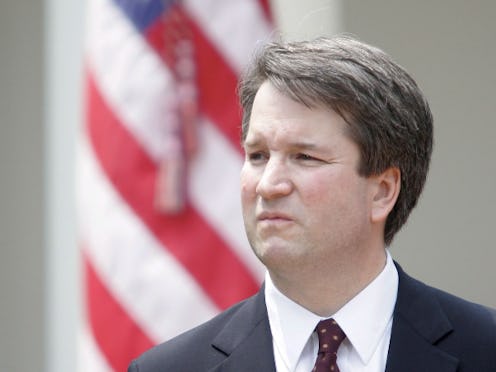News
What Brett Kavanaugh Once Argued On Clinton's Impeachment Probably Won't Matter To Trump

President Donald Trump told reporters on Thursday that he had narrowed down his list of Supreme Court nominees to four people, according to The New York Times. One of the judges on that list is Judge Brett M. Kavanaugh, whose impeachment arguments from presidencies past have progressives thinking he could spell trouble for Trump — but here's why that's not necessarily the case.
Kavanaugh is a U.S. circuit judge of the United States Court of Appeals for the District of Columbia Circuit who once clerked for Justice Kennedy and also served as an aide to President George W. Bush, according to the Times. Conservatives have recently been split by Kavanaugh's rumored candidacy for the Court, with many saying he is too moderate, according to The Hill.
Most notably, Kavanaugh wrote in a 2011 dissent in a case where a circuit court upheld the Affordable Care Act, but his dissent argued that "the court lacked jurisdiction," according to a Washington Post op-ed. Conservatives are unhappy with that decision because they believe he should have stood against the act entirely.
And that's not the only opinion Kavanaugh held that worries conservatives. Kavanaugh wrote in the report to independent counsel Kenneth W. Starr almost 20 years ago that then-President Bill Clinton should be impeached both for "lying to his staff and misleading the public," the Times reported. The Times called his opinion a "broad definition of obstruction of justice" that wouldn't be good for President Trump if it were applied to the Russia investigation.
Specifically, the report that Kavanaugh authored with Ken Starr read, according to The Hill:
The President misled his Cabinet and his senior aides by denying the relationship to them. The Cabinet and senior aides in turn misled the American people and the Congress by conveying the President's denials and professing their belief in the credibility of those denials.
White House officials told the Times that Trump was aware of Kavanaugh's views, but that his views wouldn't affect his candidacy.
But would Kavanaugh's views even be troublesome for Trump and the Russia investigation? It's not clear that they would.
First, Trump has repeatedly denied that he or the administration had any involvement with Russia or met with Russian operatives during his election campaign. But The Moscow Project, an initiative run by the Center for American Progress Action Fund, reports 82 "contacts" between the Trump team and Russia-linked operatives; 24 of those contacts were reportedly meetings. Trump's former lawyer Michael Cohen also denied his own meetings with Russian officials and denied that Trump had any connections to Russia.
So it appears the Trump administration would meet Kavanaugh's definition of obstruction of justice for misleading "the American people and the Congress by conveying the President's denials and professing their belief in the credibility of those denials."
The Times reported that Trump also "personally dictated a misleading statement to The New York Times about a secret meeting that his son arranged with a Russian lawyer at Trump Tower during the 2016 presidential campaign" — a statement that White House Press Secretary Sarah Huckabee Sanders and Trump's lawyers later denied was written by the president. That statement, among others, appears to qualify Trump for the misleading his "Cabinet and senior aides" part of the definition.
Conservatives are thus worried that Democrats could ask Kavanaugh about his views on the Trump-Russia investigation during confirmation hearings, which could hurt both Trump and Kavanaugh's chances of confirmation. But even if they do that, it won't have any real consequences for Trump.
Kavanaugh has since written more about his views; in 2009, he wrote that indicting a sitting president would "cripple" the federal government and "would ill serve the public interest, especially in times of financial or national security crisis,” according to The Hill. And the Times wrote that he even advocated for a law that would protect a sitting president from civil or criminal suits while they're in office. But, he did add that, “If the president does something dastardly, the impeachment process is available.”
It's unclear what qualifies as "dastardly," but there is no reason to think that Kavanaugh's views even matter. Even if Kavanaugh's views could hurt Trump in the Russia investigation, the House would still need a majority to begin impeachment proceedings against the president. The progressive excitement or interest in his 20-year-old writings on impeachment thus seem a little like a distraction, given that Kavanaugh has plenty of other views that do warrant worry (some progressives have pointed out that he's not exactly pro-choice).
For now, what Kavanaugh thinks about the Trump-Russia investigation seems completely irrelevant to the issue at hand, which is whether he will have a net positive or a net negative on Supreme Court decisions that will affect millions of Americans.